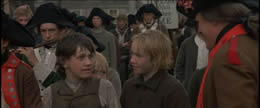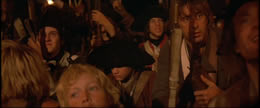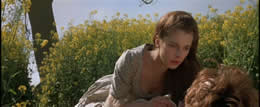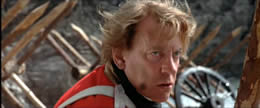
Color, 1985, 115/126m.
Directed by Hugh Hudson
Starring Al Pacino, Nastassja Kinski, Donald Sutherland, Joan Plowright, Steven Berkoff, Annie Lennox, Dexter Fletcher, Sid Owen, Richard O'Brien
BFI (Blu-Ray & DVD) (UK RB/R2 HD/PAL), Warner (US R1 NTSC) / WS (2.35:1) (16:9) / DD5.1
 The end of the 1970s New Hollywood movement is often bookmarked with the release of Heaven's Gate, a sprawling western epic lambasted by critics and ignored by audiences despite an auspicious cast and an Oscar-winning director. That situation marked a new era in Hollywood filmmaking, with films seen as too grandiose and self-inflated taken down by a media who perceived them as somehow insulting or dangerous to the status quo. Incredibly, the same scenario repeated again in 1985 with Revolution, a costly British production with an all-star cast from director Hugh Hudson, who had helmed the surprise Best Picture winner Chariots of Fire and the eccentric but beautiful Greystoke: The Legend of Tarzan, Lord of the Apes. Incredibly, almost the identical chain of events repeated yet a third time two years later with Ishtar, a desert satire of American chicanery around the globe; it made money, but the film remained an easy target for years due to the perceived hubris of its director. Interestingly, all three of these films paint portraits of America that didn't sit too well with a moviegoing culture more interested in friendly Spielbergian aliens, happy suburbs with time-traveling teens, and patriotic, gun-toting action heroes; instead, these films may have been punished for holding up a mirror and showing something a bit more challenging and difficult than anyone wanted to see.
The end of the 1970s New Hollywood movement is often bookmarked with the release of Heaven's Gate, a sprawling western epic lambasted by critics and ignored by audiences despite an auspicious cast and an Oscar-winning director. That situation marked a new era in Hollywood filmmaking, with films seen as too grandiose and self-inflated taken down by a media who perceived them as somehow insulting or dangerous to the status quo. Incredibly, the same scenario repeated again in 1985 with Revolution, a costly British production with an all-star cast from director Hugh Hudson, who had helmed the surprise Best Picture winner Chariots of Fire and the eccentric but beautiful Greystoke: The Legend of Tarzan, Lord of the Apes. Incredibly, almost the identical chain of events repeated yet a third time two years later with Ishtar, a desert satire of American chicanery around the globe; it made money, but the film remained an easy target for years due to the perceived hubris of its director. Interestingly, all three of these films paint portraits of America that didn't sit too well with a moviegoing culture more interested in friendly Spielbergian aliens, happy suburbs with time-traveling teens, and patriotic, gun-toting action heroes; instead, these films may have been punished for holding up a mirror and showing something a bit more challenging and difficult than anyone wanted to see.
Essentially a grounds-eye view of the American Revolution (aka the American War of Independence) over its most crucial eight-year period, the film is told from the viewpoint of Tom Dobb (Pacino), a fur trapper whose son, Ned (Fletcher and Owen), is forced into conscripted into the military by Sgt. Peasy (Sutherland, apparently playing a relative of his character from 1900). Though he possesses no particular political convictions, Tom becomes dragged into the upheaval of the war and becomes involved with Daisy McConnahy  (Kinski), a steadfast young Irish woman rebelling against her Tory parents. As Tom tries to follow and watch over his son, the events around him become almost too overwhelming to comprehend.
(Kinski), a steadfast young Irish woman rebelling against her Tory parents. As Tom tries to follow and watch over his son, the events around him become almost too overwhelming to comprehend.
Plagued with problems during production and rushed into theaters for Christmas before it was officially completed, Revolution became notorious as the film that brought down its production company, Goldcrest, and dealt a nasty blow to the state of high-profile British filmmaking at the time. Much of the blame was placed on the script by Robert Dillon, a man with perhaps the oddest screenwriting career of his generation ranging from X: The Man with the X-Ray Eyes to Prime Cut and 99 and 44/100% Dead. There's no question that this isn't your average costume epic; the film refuses to block out its action in easy-to-digest historical chunks for the viewer, instead offering an impressionistic view of history in which months and even years can spill by in the blink of an eye.  Pacino also received some blame for his accent, which isn't quite fair; considering the wide diversity of nationalities in the area at the time, a Dutch-ish Brooklyn speaking style is about as reasonable as any. (On the other hand, Kinski doesn't sound even remotely Irish. God only know what they were all thinking there.) The supporting cast features some truly surprising choices, including a villainous turn by Richard O'Brien (best known as Riff-Raff from The Rocky Horror Picture Show, which he also wrote), and even singer Annie Lennox as a spirited revolutionary with a penchant for graffiti. Weirdly, Jonathan Adams (who played Dr. Scott in Rocky Horror) pops up in a supporting role as well. On top of that you get absolutely stunning handheld cinematography by the late Bernard Lutic (Winged Migration) and avant garde but sometimes beautiful music by John Corigliano, who had recently composed his first score for Ken Russell's Altered States. Is this a lost masterpiece? No, not quite, but it's much more interesting and rewardin
Pacino also received some blame for his accent, which isn't quite fair; considering the wide diversity of nationalities in the area at the time, a Dutch-ish Brooklyn speaking style is about as reasonable as any. (On the other hand, Kinski doesn't sound even remotely Irish. God only know what they were all thinking there.) The supporting cast features some truly surprising choices, including a villainous turn by Richard O'Brien (best known as Riff-Raff from The Rocky Horror Picture Show, which he also wrote), and even singer Annie Lennox as a spirited revolutionary with a penchant for graffiti. Weirdly, Jonathan Adams (who played Dr. Scott in Rocky Horror) pops up in a supporting role as well. On top of that you get absolutely stunning handheld cinematography by the late Bernard Lutic (Winged Migration) and avant garde but sometimes beautiful music by John Corigliano, who had recently composed his first score for Ken Russell's Altered States. Is this a lost masterpiece? No, not quite, but it's much more interesting and rewardin g than its reputation might suggest.
g than its reputation might suggest.
Briefly available on VHS in its stunted theatrical cut, Revolution was revisited by Hudson in 2009 for a director's cut initially released on DVD by Warner (with an airbrushed cover that must be seen to be believed). He removed about 10 minutes of material deemed superfluous or confusing from the film, including a lengthy scene between Daisy and her father; for camp movie fans, the biggest change was the omission of Pacino's unintentional dialogue howler during his penultimate scene: "My mouth belongs anywhere I put it!" The biggest alternation to the film was the addition of a new voice over by Pacino, which actually helps quite a bit in clarifying story points and explaining his relationship with Daisy (who now reminds him of his late wife). The melancholy line readings are bound to remind some viewers of his similar world-weary narration from Carlito's Way, which can only be a good thing.
The dual-format BFI release in 2012 features Region B/Region 2 encoding presentations of the film on both Blu-Ray and DVD; the latter was the only one available as of this writing for review, but an update will be on the way when the HD disc appears. The transfer looks comparable to the Warner release, which means it's quite impressive and about as good as standard def will allow. This is certainly a more pleasant way to watch the film than the ragged, often dark theatrical prints, and the brutally cropped VHS version doesn't even deserve a mention. The Blu-Ray also contains the original theatrical cut for those who want to see how it all played out originally, though few will probably make that their version of choice. Audio can be played in lossless 5.1 or the theatrical 2.0 stereo mix, which is fine either way; it's not an aggressive track for the most part, but it sounds lush and spacious where it counts. Optional English subtitles are also included. The DVD only includes the theatrical trailer and the featurette from the previous Warner disc, "Revisiting Revolution," a 23-minute chat with Hudson and Pacino about going back to complete the film and assessing it again decades after its tumultuous fate, along with a 21-minute look at the re-cutting of the film with Hudson's voice over during side-by-side comparisons of the two versions. He makes a very persuasive argument for a crucial change at the end of the film which entirely alters the fate of one character and ends the film on a more wistful and realistic note than the Hollywood finale originally seen in theaters. As usual, the packed insert booklet provides a great deal of additional insight and context for the film including essays by Nick Redman, Philip French, Corigliano, and Michael Brooke, as well as a Monthly Film Bulletin excerpt about the film by Pam Cook.
Reviewed on June 4, 2012.





